Climate distress is reshaping young people’s professional ambitions
Many are questioning the relentless “climb to the top” that encourages a focus on the self
Hi there!
Welcome to Gen Dread, a newsletter about how the climate crisis is making us feel, why that’s happening, and what we can do about it. Subscribe now to find community, comfort, and practical coping strategies from experts all around the world.
We’ve been taught a very narrow definition of “success”
As kids, a lot of us were told the same story: the shape of success is an arrow pointing up.
If you finish high school, climb on up to the next level of education (...it’s literally called “higher” education). If you finish that, get a job and keep climbing up, get promoted, take on more responsibility, be in charge of more people, become the boss, get to the top. This is what ambition looks like. Up, up, up.
Photo by Cesar Cid on Unsplash
But as young people fearfully watch the climate crisis unfold, a lot of them are asking: why?
The crescendo of climate anxiety among young people is well documented, but it’s crucial we start to get curious about what it means, and how that anxiety is sculpting – and resculpting – the vision people have for their lives.
In a 2021 study that Britt co-authored called “Young People’s Voices on Climate Anxiety, Government Betrayal and Moral Injury: A Global Phenomenon,” we surveyed 10,000 people, ages 16 to 25, across 10 different countries: India, Nigeria, Philippines, Portugal, Australia, US, UK, Finland, France, and Brazil. Almost half said that their thoughts and feelings about the climate crisis have significantly impaired their ability to function: to eat, work, sleep, spend time in nature, have fun, and be fully present in their relationships.
In our more recent study based on the same dataset, we found that females experience more difficult thoughts and feelings about the climate crisis than males, and that climate distress tends to increase with age, even within this narrow bracket. We also found, perhaps unsurprisingly, that young people in lower and middle-income countries that have contributed less carbon pollution than rich countries yet are more exposed to climate hazards, experience stronger psychological impacts from climate change than youth in richer countries. This is why the growing conversation around climate and mental health must be centered on climate mental health justice.
And these feelings are actively changing the landscape of work for young people. A recent BUPA poll shows that 2 in 3 Gen Zers are anxious about climate issues, and almost as many feel it’s important for their employers, and future employers, to show true environmental leadership. Over half (54%) would take a pay cut if it meant working for an employer that better aligns with their ethics.
But there’s another consequence to this distress that could have dramatic societal implications: a redefining of what it even means to live a “successful” life in the first place, and a real shift in young people’s ambition. Rather than continuing on with an unquestioning allegiance to the upward-pointing arrow, many are seeking ways to grow and expand more healthfully and holistically instead; being the best, the most, the fastest, the richest is no longer the goal. The climate crisis is causing previous ambitions to waver, to unravel, to morph into new and surprising and courageous shapes.
But what some people are finding is that radical shifts in our ambition can free us up to take care of other people. Disengaging from traditional career expectations has liberated them from the laser focus on their individual selves and provided profound, outwardly radiating benefits to their communities.
That interdependence, that offering of yourself to others – your unique skills, your time, your presence, your care – is the way forward. It is the solution. And so we’d like to share a couple of these stories with you now, and hear yours, too: if the climate crisis has reshaped your ambitions in life, or shifted your focus from yourself to others, tell us all about it in the comments below or send us a note!
A young doctor finds a new purpose to power her work
A young pediatrician who was born in India, raised in Toronto, and now lives in New York City, recalls that she’d always been ambitious, and had worked really hard to arrive at her specialty of pediatric rheumatology with a particular focus on lupus.
“Applying for medical school was a competitive process,” she explains. “And with each stage of training it was the same – if you wanted the program of your choice, specialty of your choice, you had to have grades, research, networking and interview skills. There was no choice but to be ambitious. I wanted to continue in my field and super-specialize. I was accepted into one of the top programs in North America for research. At that time, it felt like there was so much I wanted to do in my field, so much I wanted to learn.”
But after years of residency placements in random American cities not of her choosing and then practicing medicine within the the frequently punishing framework of the U.S. healthcare system, the added instability of the environment began to feel increasingly unbearable.
What happened when all that ambition began to dramatically change?
She chose to give up her hard-earned specialty and fully reshape her career. She stopped striving for the typical doctor’s career path – often a grueling and relentless trajectory – and instead took a job in a school in the Bronx, educating and looking after at-risk kids, which lets her focus more on educating the next generation rather than accumulating personal power and prestige. This shift, she notes, has also freed up more time to travel and live and connect meaningfully with her community. She says:
“The climate crisis just feels so daunting: water shortages, food shortages, extreme weather. As a pediatrician I know that it’s all linked to our physical and emotional health, and to childrens' health and development. Making a name for myself seems stupid in the grand scheme of things. Leaving a legacy also seems silly – who will care about things like that 10, 20 years? Teaching and educating seem like the only contributions that make sense to me. I contribute to articles and podcasts, which have all been unpaid and done in my free time. Between the pandemic and climate denial, education has become so important, so now I’m trying to contribute in that way.”
A major life decision redefined this author’s relationship with work
A young author originally from Iqaluit, now living in Vancouver, began her career studying ecology and environmental systems. And she’d assumed, as many of us do, that alongside a successful career would come biological children and the ability to own a home. But then she started sensing a shift in her ambition.
It wasn’t so much pinned to one particular moment, but rather an gradually escalating sense of dread around the climate crisis in general as more and more tangible evidence of it piled up, undeniably, in front of her eyes:
“I have always had a growing sense of unease related to global climate issues, and socioeconomic issues in my community but I think it all came to a head about two years ago. My husband and I were talking about whether or not to have a child. I have always wanted to be a mother but have been on the fence since I was in my early 20s about bringing a child into this world as it is. We decided, finally, not to have a baby and a huge factor in that decision was the state of the globe and our climate crisis. We live in Vancouver and experiencing the rapid weather changes over the last 10 years has been really concerning. Our global systems are really changing in a visible and tangible way.
I also really noticed during the COVID pandemic how much our society relies on upholding a capitalist machine that is literally destroying our planet by exploiting humanity. It's hard to conceptualize breaking free of this system while being completely dependent on the cheap products and services it provides for low income people.”
She gradually realized that she could better be of service in the literary arts. She shares:
“Even when my ambitions changed I always knew I wanted to be a force to be reckoned with in my field and to fight for Indigenous rights and women's rights and equity and inclusivity. I wanted to be a voice that rang out with purpose and insight.”
Traditional milestones like parenthood and home ownership have always been sold to us as the reward, the reason we work so hard at our careers. At the top of that upward pointing arrow, we’ve been told, is a sweet little house with a backyard and a couple of kids on a Slip ‘n Slide. But when the climate crisis and the capitalism that’s fueling it suddenly render those milestones unrealistic or out of reach, a lot of young people understandably begin to question why they should continue to devote the majority of their days, lives, and energy to this particular model of work. She explains:
“The realization that my husband and I will never be able to afford a home of our own remotely close to where we live now has really changed my attitude about work.
My ambition to work hard towards a larger goal of stability like home ownership and having a family has really been shaken and I have realized that I no longer want to take on the stress of multiple competing priorities, constantly missed deadlines, and passive aggressive supervisory tactics to do a job that doesn't pay enough and exacerbates my anxiety and ADHD.”
Choosing to step off a very demanding climb up the professional ladder allows her to be a person first, and a worker second. She describes her new ambition like this:
“I want to become physically healthier again and do so in a way that engages with my family and friends to build my interpersonal relationships rather than treading water at a job I don't even enjoy.”
Our doctor in New York City has similarly come to step inside a new ambition that’s more centered around taking care of vulnerable people, despite the personal sacrifices involved. She says:
“I love kids and taking care of them, and I can still do that without being as ambitious as I was before. I work in an underserved community and make much less than I would at a private practice or a boutique practice or concierge practices.”
The problem with the upward-pointing arrow is that it can often require a relentless focus on the self. Climate change is causing a lot of young people to question the way we define a “successful” life. When we question that, reject the traditional norms, and choose another more sustainable road, it can open up so much space and time to care for others and the wider world we want to live in.
We’d love to hear from you: let us know how the climate crisis is changing the ambitions you have for your life, and what you’re noticing as a result of those changes.
Making Waves
Jess Serrante is a long-time climate activist and a leadership coach for climate leaders. Her group program, the Feminine Climate Leadership Coaching Group (FCL) starts on March 6th and there are still a few open spots in the cohort! FCL is a space for climate leaders who want to embody powerful feminine leadership — leadership that is compassionate, connected, creative and collaborative — in their work and lives so that they are supported while doing effective, meaningful, and satisfying climate work! Scholarships are available for BIPOC and frontline climate leaders.
Anna Louie Sussman is a journalist working on a book for HarperCollins about why people are having fewer children today than in earlier generations. She would love to speak to people who have considered/are interested in having children, but who hesitate or do not plan to move forward primarily because of their concerns about the climate crisis. If that describes you, you can email her annalouiesussman@gmail.com or reach her @annalouiesuss on Twitter or Instagram.
With Many Roots is a regenerative mission-led equitable business that currently focuses on climate science and climate silence by delivering collaborative, interactive, educational workshops based on robust research. Together with Sophia Cheng, founder of With Many Roots, we collected a bunch of terms introduced in the Generation Dread book and turned them into a visual glossary that you can access below:
“Feelings of despair about the climate crisis have become so commonplace that “eco-anxiety” is now an emerging field in psychology. Given the drumbeat of troubling climate news, it’s easy to fall into a state of doom paralysis. But these six podcasts — full of smart, passionate reporting about the natural world and our relationship to it — will leave you more informed and perhaps better able to embrace climate optimism”. Read this timely article by Emma Dibdin below:
As always, you can share your thoughts and reach the Gen Dread community by commenting on this article or replying to this email. You can also follow along on Twitter and Instagram.
‘Till next time!


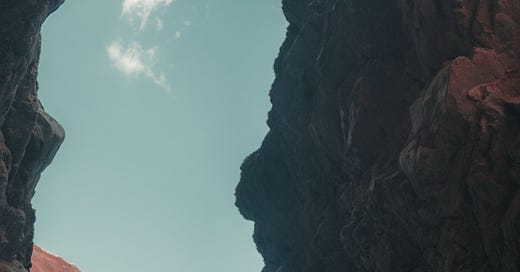



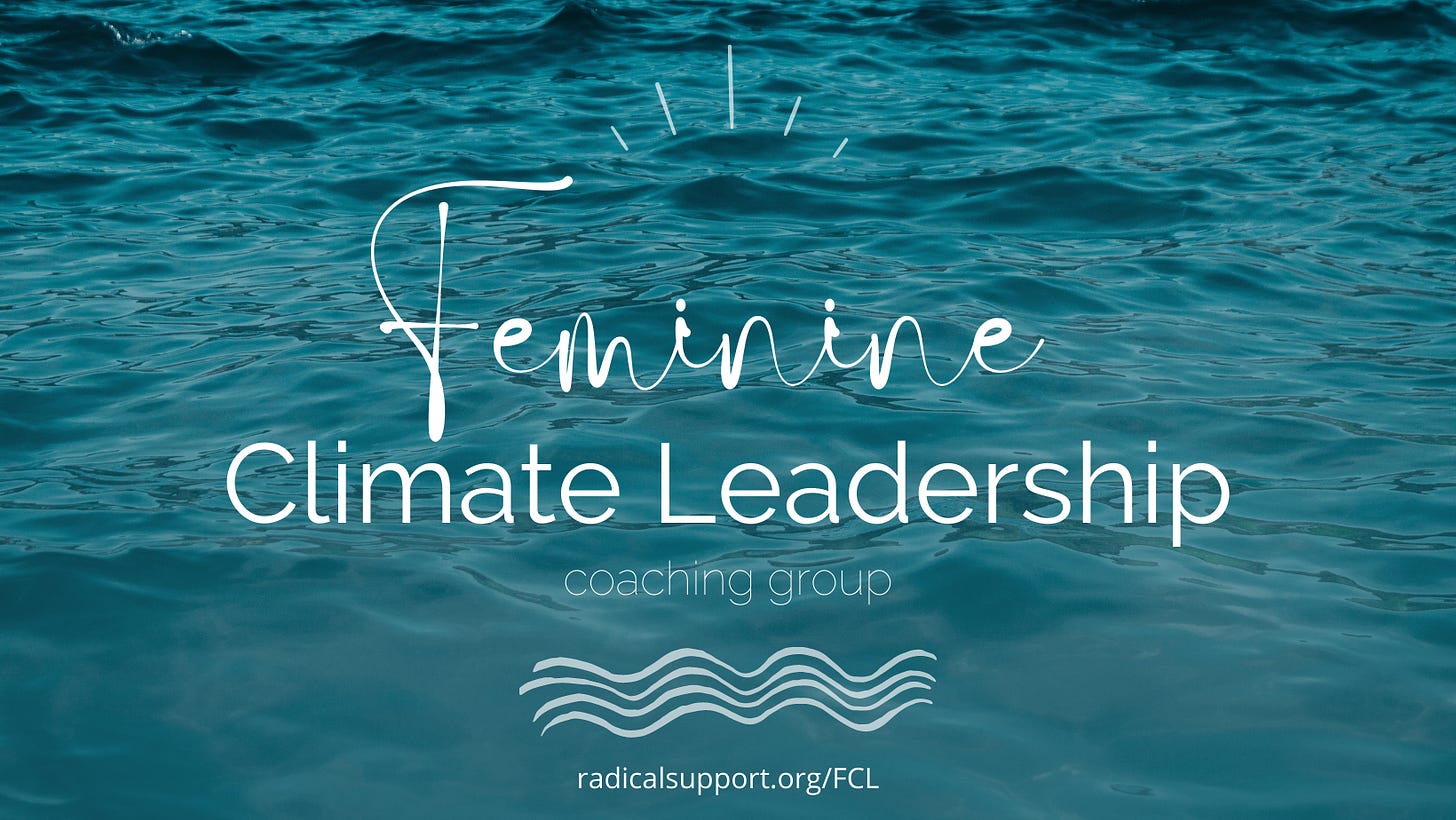
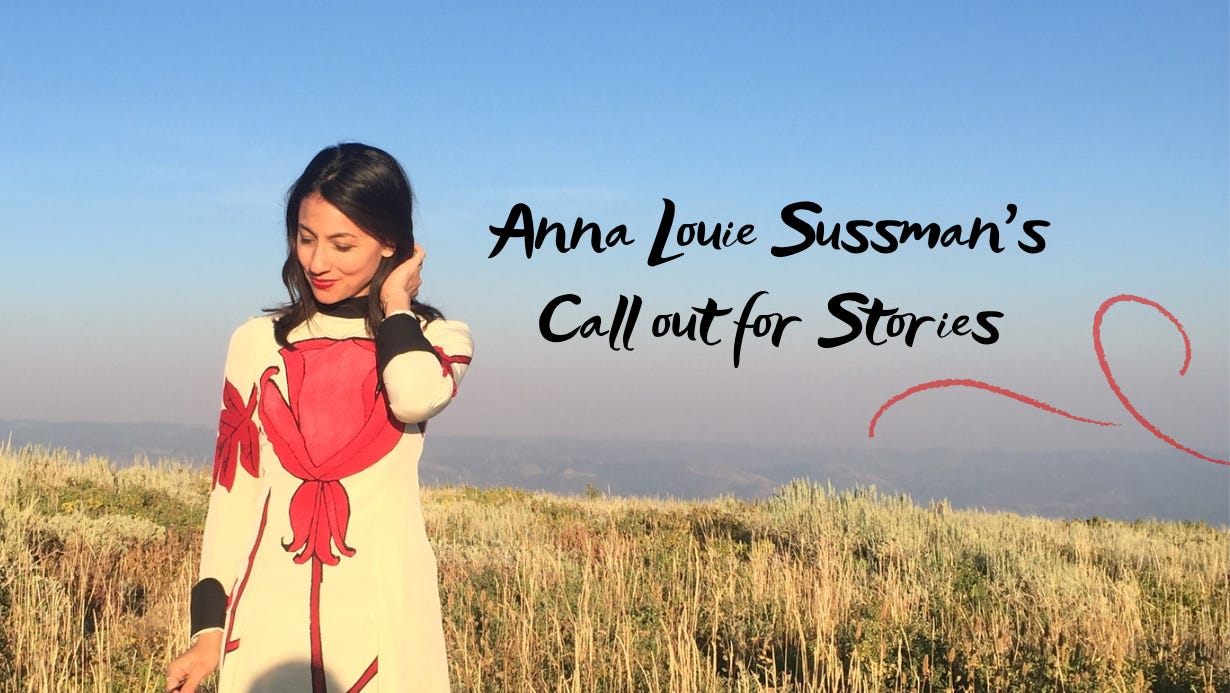
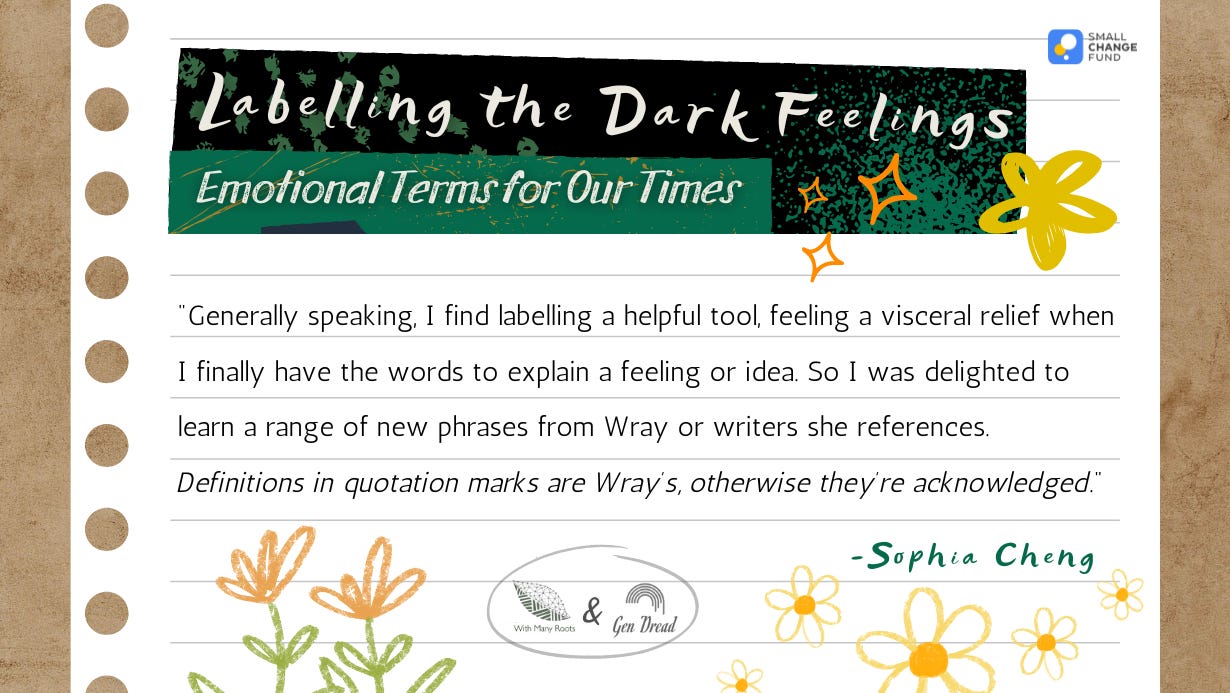
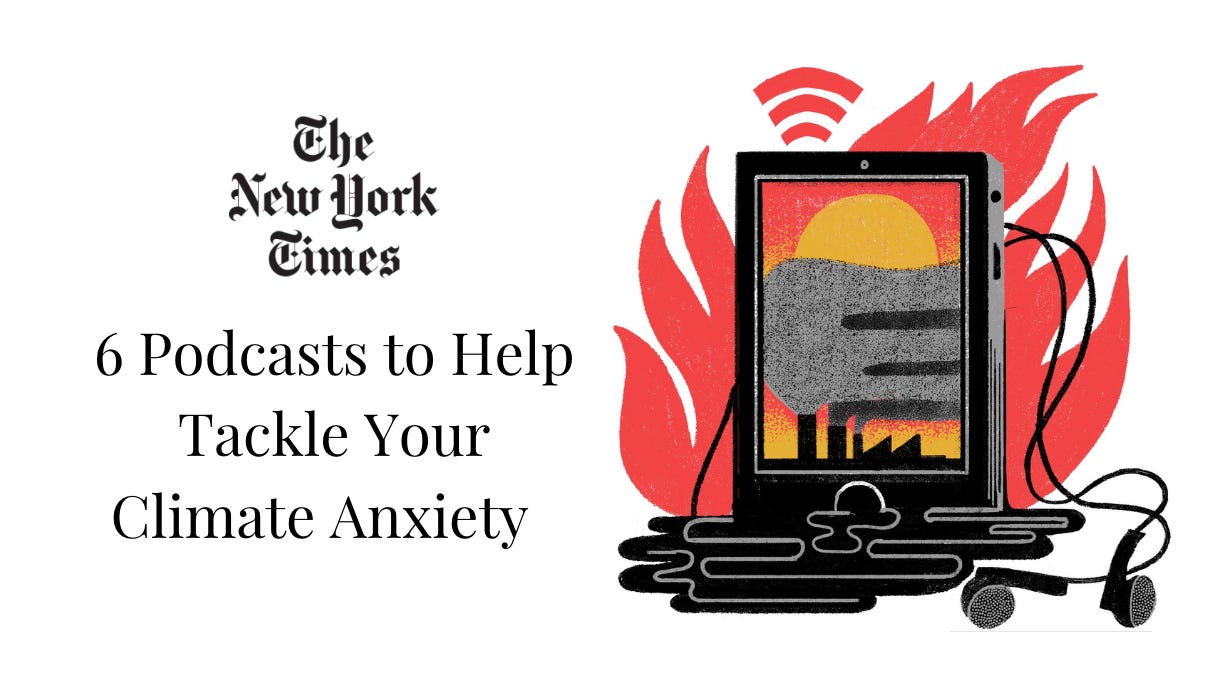
As a nurse who worked in hospice care it’s been my antidotal observation that most of us in this industrial civilization suffer this existential crisis of purpose. We spend so much of our life doing meaningless tasks. Just most people don’t face these feeling of regret until the last few days of life. I have never had anyone say to me in their last days, “I wish I would have worked more and made more money”.
Excellent post. Even older people like me (55) are rethinking what we value, even as we worry about our children and how they'll move forward with climate devolution.